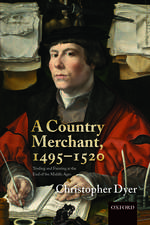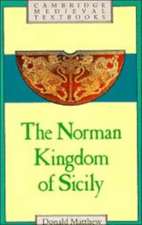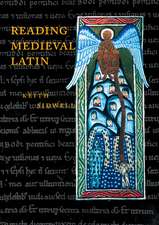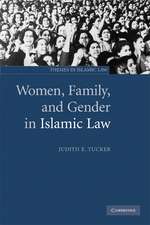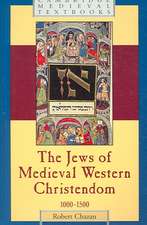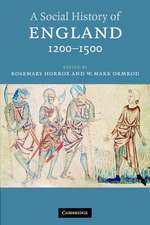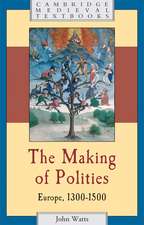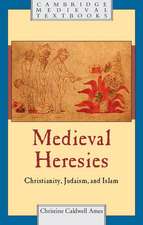Sexuality in Europe: A Twentieth-Century History: New Approaches to European History, cartea 45
Autor Dagmar Herzogen Limba Engleză Paperback – 17 aug 2011
| Toate formatele și edițiile | Preț | Express |
|---|---|---|
| Paperback (1) | 204.27 lei 6-8 săpt. | |
| Cambridge University Press – 17 aug 2011 | 204.27 lei 6-8 săpt. | |
| Hardback (1) | 552.94 lei 6-8 săpt. | |
| Cambridge University Press – 17 aug 2011 | 552.94 lei 6-8 săpt. |
Din seria New Approaches to European History
- 11%
 Preț: 553.80 lei
Preț: 553.80 lei -
 Preț: 223.66 lei
Preț: 223.66 lei -
 Preț: 299.44 lei
Preț: 299.44 lei -
 Preț: 236.92 lei
Preț: 236.92 lei -
 Preț: 237.15 lei
Preț: 237.15 lei - 8%
 Preț: 482.17 lei
Preț: 482.17 lei - 8%
 Preț: 441.68 lei
Preț: 441.68 lei -
 Preț: 200.13 lei
Preț: 200.13 lei -
 Preț: 245.24 lei
Preț: 245.24 lei -
 Preț: 192.42 lei
Preț: 192.42 lei -
 Preț: 227.49 lei
Preț: 227.49 lei -
 Preț: 137.74 lei
Preț: 137.74 lei - 9%
 Preț: 594.01 lei
Preț: 594.01 lei -
 Preț: 209.63 lei
Preț: 209.63 lei -
 Preț: 186.07 lei
Preț: 186.07 lei -
 Preț: 185.12 lei
Preț: 185.12 lei -
 Preț: 178.30 lei
Preț: 178.30 lei -
 Preț: 176.86 lei
Preț: 176.86 lei -
 Preț: 295.08 lei
Preț: 295.08 lei -
 Preț: 278.72 lei
Preț: 278.72 lei -
 Preț: 242.54 lei
Preț: 242.54 lei - 19%
 Preț: 470.76 lei
Preț: 470.76 lei -
 Preț: 241.62 lei
Preț: 241.62 lei -
 Preț: 292.19 lei
Preț: 292.19 lei -
 Preț: 358.52 lei
Preț: 358.52 lei -
 Preț: 338.22 lei
Preț: 338.22 lei -
 Preț: 311.99 lei
Preț: 311.99 lei -
 Preț: 315.04 lei
Preț: 315.04 lei -
 Preț: 273.89 lei
Preț: 273.89 lei -
 Preț: 300.79 lei
Preț: 300.79 lei -
 Preț: 319.88 lei
Preț: 319.88 lei -
 Preț: 288.37 lei
Preț: 288.37 lei -
 Preț: 304.23 lei
Preț: 304.23 lei -
 Preț: 238.59 lei
Preț: 238.59 lei
Preț: 204.27 lei
Nou
39.10€ • 40.66$ • 32.71£
Carte tipărită la comandă
Livrare economică 15-29 martie
Specificații
ISBN-10: 0521691435
Pagini: 240
Ilustrații: 44 b/w illus.
Dimensiuni: 150 x 225 x 10 mm
Greutate: 0.38 kg
Editura: Cambridge University Press
Colecția Cambridge University Press
Seria New Approaches to European History
Locul publicării:Cambridge, United Kingdom
Cuprins
Recenzii
'A masterly synthesis of sexuality's most extreme century. This virtuoso account always links sex to politics, but its real merit is to give emotions, bodies, and pleasures a history.' Philipp Sarasin, Professor of Modern History, University of Zurich
'There is not [a] better comparativist than Herzog to illuminate the unexpected twists and turns of this composite history - a landmark in European synthesis and a must-read for all historians of sexuality.' Nancy F. Cott, Jonathan Trumbull Professor of American History, Harvard University
'Herzog develops a sweeping analysis of the central role of sexual practices, cultures, politics, and violence in a century of war, mass mobilization, and wrenching social conflict and change.' George Chauncey, Professor of History, Yale University
Descriere
This original book brings a fascinating and accessible account of the tumultuous history of sexuality in Europe from the waning of Victorianism to the collapse of Communism and the rise of European Islam. Although the twentieth century is often called 'the century of sex' and seen as an era of increasing liberalization, Dagmar Herzog instead emphasizes the complexities and contradictions in sexual desires and behaviours, the ambivalences surrounding sexual freedom, and the difficulties encountered in securing sexual rights. Incorporating the most recent scholarship on a broad range of conceptual problems and national contexts, the book investigates the shifting fortunes of marriage and prostitution, contraception and abortion, queer and straight existence.
It analyzes sexual violence in war and peace, the promotion of sexual satisfaction in fascist and democratic societies, the role of eugenics and disability, the politicization and commercialization of sex, and processes of secularization and religious renewal.






